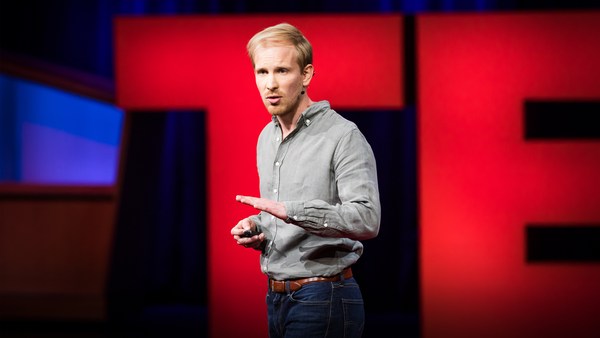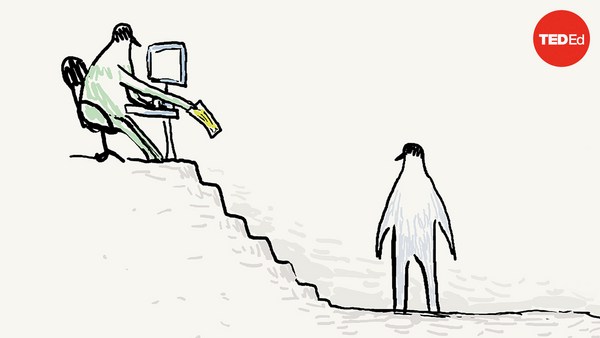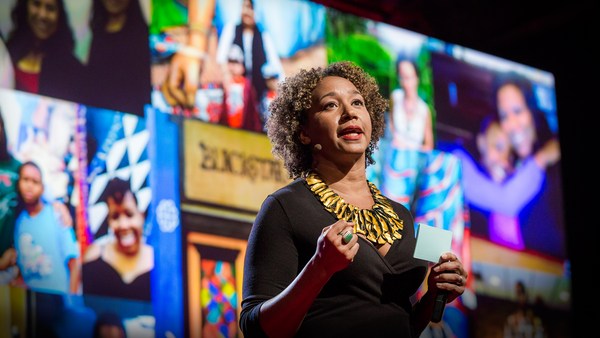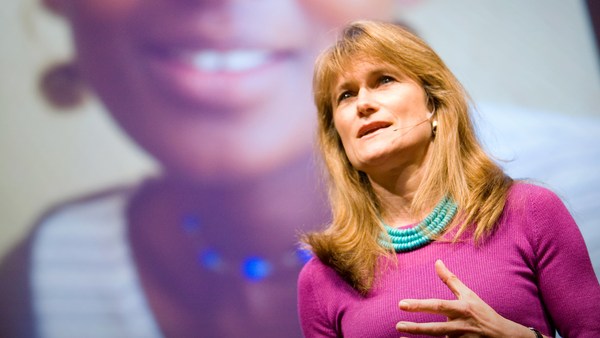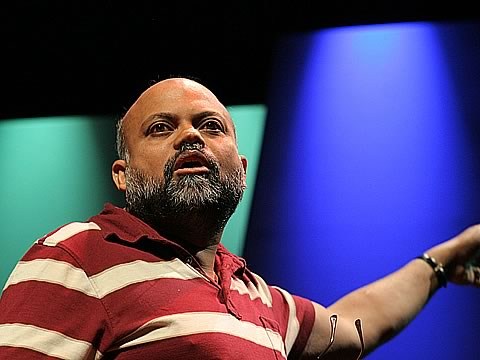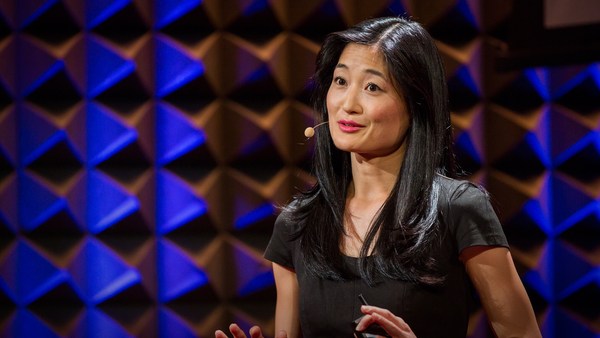Growing up in Mississippi, my family never talked about money, but I could infer how much people had by pattern keeping at Christmas time. My uncle Chip was always good for money, an absolute delight. JCPenney's, here I come.
(Laughter)
Mama Adele would always give us apples, oranges, butterscotch candy, in a brown paper bag. It was a gift given with love and it meant a lot coming from the matriarch of our family. Now my parents, my parents would make sure my twin and I were fresh in the latest fashions. Girbaud jeans, Starter jackets. Looking good made us feel rich, even if we weren't.
So it was interesting because I remember having a myriad of conversations about prison reform, the education system, voter rights, but a candid conversation about money, it never happened.
When I went to graduate school, my world expanded. Hearing my friends talk about their overseas adventures made me envious. I didn't even have a passport at the time. When I got my first job post graduate school, I was making 70,000 dollars. I was rich. But that shopping spree at JCPenney's was no longer going to scratch that itch. I needed to do whatever I could to be legit wealthy.
I think that’s why one of the many Oprah Winfrey episodes that I watched [in] the early 2000s stood out to me. On this particular episode, Suze Orman was the guest. And for those of you who don't know, Suze is an American author and financial advisor, and she has the most perfect white teeth I've ever seen.
(Laughter)
Well, Suze was talking about 401(k)s, and I got the basic gist of what she was saying. Save a little money now, have a lot of money in the future. Sounded great, amazing, sign me up. So I went to meet a wealth advisor, somebody I met off the internet. I just knew that this random person was going to unlock some magical room and give me all the tricks I needed to be wealthy. I mean big house, fancy cars, luxurious vacation. I was excited until I wasn't. The nondescript building in a strip mall did not boost my confidence that this was how the wealthy managed their affairs.
(Laughter)
I was placed in a small white waiting room and I stayed there for what felt like forever. Finally, a man came in who could not even bother to learn the correct pronunciation of my name and asked me what my goals were for the future. OK, I'm excited again. I know the answer to this. Number one, I would like to retire comfortably by the age of 60. Number two, I would like to be able to take care of my mom. His response, "I don't know why taking care of your mother is your responsibility." He then went on to speak in some financial jargon I could not understand.
The entire interaction took me so aback that I vowed to share the bare minimum the rest of the meeting. I could not figure out what I was missing, but it made me question everything. Maybe I did not know what wealth was. Maybe wealth was not intended for people like me. Maybe I was reaching for too much.
So I find it funny, or maybe serendipitous that I think about cash and wealth all the time now. For the last ten years, I've led an organization in Jackson, Mississippi, that takes a radically community-driven approach to supporting families, mainly Black women, that live in federally subsidized affordable housing. Our programs are strategic and holistic.
A few years ago, we became concerned that we were not moving the needle on poverty. So we went to the women that we work with and we said, "What are we missing?" The answers were all different, but the underlying problem was the same. The problem was the lack of cash. No money for pizza on a Friday night was causing stress. Unexpected car repairs were leading to unemployment because people could not get to and from work.
So we began to research how do you give money, not another program, to people experiencing poverty? In 2018, we launched the Magnolia Mother's Trust, this country's first modern guaranteed-income program, and the first in the world to center its efforts on Black women.
(Cheers)
Thank you.
(Applause)
Quickly, for the uninitiated, a guaranteed income is a specific amount of money given to a specific population over a set amount of time. It's typically funded by private philanthropy or in some instances, the public sector. It's not a new idea. Jenny Tillman, a mom and welfare activist, called for a guaranteed income way back in 1972, and even Dr. Martin Luther King Jr. and President Nixon indicated that a guaranteed income could help solve for poverty.
It's not a new idea, but like I said, we are pioneers and our efforts are working. We provide 1,000 dollars a month for 12 months to Black mothers. And our goal is simple: to provide these women with the breathing room they need by giving them the financial resources they need to dream a little bigger. We provide -- Thank you.
(Applause)
We provide 1,000 dollars a month for 12 months, and we have proven that 12,000 dollars is a life-altering amount of money. Yes, it allows you to take care of the practical needs, like getting that car repaired, but it also allows you to shift your reality. Literally, shift your reality from scarcity to abundance, from tunneling to imagination, from scraping by to genuine opportunity.
There are over 100 guaranteed income programs currently being implemented in this country, and many were inspired by what we started in Jackson, Mississippi, of all places. Black women have ushered in a movement and it has been beautiful, but it is just the start.
Over the last few years, as I have watched more and more moms move towards income stability, I have listened as they have began to dream about a life free of economic stress. I have watched as they began to dream about wealth. Now, I understand that the most basic definition of wealth is what you own, minus what you owe. And I also know we typically define it as having big cars, luxurious vacations, one-upping our neighbor on this never-ending ladder of economic success. But for many women, particularly women of color, who do not have access or the ability to earn a living wage because of pay inequity, that definition is meaningless or inadequate.
Lord knows that we must solve for the racial wealth gap, and it is going to take radical imagination and a reinvention of big systems. But until then, people cannot be gaslit into believing that their definition of wealth is invalid or less important.
(Applause)
Thank you.
(Applause)
Bell Hooks once wrote, "Definitions are a vital starting point to the imagination. What one cannot imagine cannot come into being." One day I was having a conversation with Coco, a mom within the Magnolia Mother's Trust, and I asked her, "What is wealth to you?" Without skipping a beat, she said, "If anything were to happen to me, my family would have the money to cover my burial expenses." Asking more and more women the same question, I have come to learn that wealth is dignified funerals, the privilege of privacy, the ability to complete school, own a business, or the thrill of being the extravagant auntie. All of these are definitions of wealth to them.
Wealth is about a sense of agency, a sense of freedom, the collective well-being of the whole. It is not an individual pathological pursuit. For too long, we have allowed financial institutions to define wealth and the process by which we build it. I have never had a mother say to me, wealth is having stocks and bonds, equity in her home, or even a retirement account. Instead, they dream about what a life of ease and care would look like.
Another case in point. I was having a conversation with a mom I work with, and I asked if she had six months’ worth of savings to cover an emergency. She started laughing. She could not even see herself in the equation that I was offering. She said that "Before the Magnolia Mothers Trust, I didn’t even have a savings account, let alone one month’s worth of savings.”
I said, "OK, let me ask the question differently. What is wealth to you?" She said, "Oh, that's easy. All of my bills paid every month with a little left over for anything extra." She knew exactly what she needed. Our narrow definition simply did not address her needs.
Hearing these responses, time and time again, I began to realize that we have to redefine wealth, and we actually can redefine wealth. And a way we do that is by listening to others and then by being brave enough to listen to ourselves.
So of course, y'all, I had to ask myself, what is wealth? And I will admit to each of you all because we're best friends now --
(Laughter)
That when I first asked myself this question, I started crying. I realized that for over 20 years, I had been holding on to a definition that was not written for me, nor did it mirror my desires. I never wanted that big house backed up against the lake. I simply wanted what it represented in my mind: My ability to gather my people, to nourish them, to spoil them, to make sure that we were protected and cared for before we go out into the world doing the hard work of caring for others.
Please hear my words. I am not saying that women experiencing poverty simply need space to dream. If you all walk out of this theater with that, I am going to be very unhappy.
(Laughter)
What I am saying is that the space to dream mixed with cash can lead to transformation that can lead to true wealth. It is my belief that we, all of us in this room, are made less [wealthy] by virtue of tolerating a country where anyone has to prove their worth. We may have 500 different definitions of wealth, but we can all agree that we are all degraded by normalizing immoral inequity. After all these years, I have finally --
(Applause)
After all of these years, I have finally accomplished what I set out to achieve all those years ago with that random wealth advisor. I am emboldened and empowered to manage my wealth and no, I don't mean money. I mean, I am a loving daughter, I am a mom who takes their boys on vacation and you best believe I am an extravagant auntie.
(Laughter)
We have a poverty of imagination about what makes you wealthy. I mean the things that people say about you at your funeral. I mean legacy. But here's the thing. From where I sit, we can offer that kind of wealth to everyone. And yes, I am going to play on the word here, I can guarantee it, if we are simply willing to understand that a small financial investment can change someone's life, giving them the flexibility, breathing room and space to define and build wealth on their own terms. And that may be wealth defined by equity, love, honor and delight.
Thank you.
(Applause and cheers)
